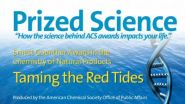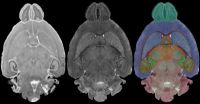(Press-News.org) WASHINGTON, Oct. 25, 2010 — Green gasoline is plants in your tank, motor vehicle fuel made from corn, cornstalks, sugarcane, and other crops. It also is gasoline made with recipes that reduce the need for harsh, potentially toxic ingredients like hydrofluoric acid or sulfuric acid that are used at about 210 oil refineries worldwide. Now scientists have found an answer to a half-century quest for a way to make gasoline in exactly that kind of greener, more environmentally-friendly way.
That advance highlights the second episode of a new video series, Prized Science: How the Science Behind ACS Awards Impacts Your Life, from the American Chemical Society (ACS), the world's largest scientific society. Rich with high-definition graphics and animations, and commentary suitable for classroom use and other audiences of students and non-scientists, the videos are available without charge at the Prized Science website, YouTube, iTunes and on DVD.
ACS encourages educators, schools, museums, science centers, news organizations, and others to embed links to Prized Science on their websites. Additional episodes in the series, which focuses on ACS' 2010 award recipients, will be issued in November and December.
"Estimates suggest that more than 30,000 significant prizes -- most for scientific or medical research -- are awarded annually," noted ACS President Joseph S. Francisco, Ph.D. "For many of them, the spotlight of news media publicity rightly focuses on the recipients. Often lost behind the headlines, is an explanation of how the science honored in the award impacts the everyday lives of people throughout the world. That is Prized Science's goal, to give greater visibility to the science that won the prize. In doing so, Prized Science strives to give people who may have no special scientific knowledge, the opportunity to watch, listen, and discover how the chemistry behind ACS' awards transforms life."
The new video features research by Vincent D'Amico, Emiel van Broekhoven, Ph.D., and Juha Jakkula. They invented a new process for making alkylate, a key ingredient in clean-burning gasoline. Alkylate has a high octane rating and yet is low in sulfur, nitrogen, and substances that contribute to air pollution. The process reduces the need for use of potentially toxic substances, including up to 200-400 tanker-truck loads of sulfuric acid that a typical oil refinery would need to handle each month to make alkylate.
D'Amico is with Lummus Technology, Inc. in Bloomfield, N.J.; van Broekhoven is with Albemarle Corporation in Amsterdam, The Netherlands, and Jakkula is retired from Neste Oil in Espoo, Finland. They are the winners of the 2010 ACS Award for Affordable Green Chemistry.
Already available in Prized Science episodes No. 1:
"Are We All From Mars?" Featuring Richard Zare, Ph.D., winner of the 2010 Priestley Medal, highest honor bestowed by ACS. Zare is the Marguerite Blake Wilbur Professor in Natural Science at Stanford University. The video highlights Zare's work on the possibility that life existed on Mars and seeded life on Earth; in developing the technology that helped scientists decode the human genome; and in pioneering efforts to enlist nanoparticles in medicine
Prized Science episodes No. 3 and No. 4, scheduled for November and December:
"Who Shrunk the Chips?" Featuring Robert Miller, Ph.D., winner of the 2010 ACS Award for Chemistry of Materials, who helped develop materials that shrunk the size and boosted the power of computer chips.
"Taming the Toxic Tides" Featuring Michael Crimmins, Ph.D., winner of the Ernest Guenther Award in the Chemistry of Natural Products, whose research underpins efforts to develop treatments for a terrible form of food poisoning involving shellfish.
The ACS administers more than 60 national awards to honor accomplishments in chemistry and service to chemistry. The nomination process involves submission of forms, with winners selected by a committee consisting of ACS members who typically are technical experts in the nominee's specific field of research.
INFORMATION:
The American Chemical Society is a nonprofit organization chartered by the U.S. Congress. With more than 161,000 members, ACS is the world's largest scientific society and a global leader in providing access to chemistry-related research through its multiple databases, peer-reviewed journals and scientific conferences. Its main offices are in Washington, D.C., and Columbus, Ohio.
New American Chemical Society Prized Science video focuses on 'green gasoline'
2010-10-26
ELSE PRESS RELEASES FROM THIS DATE:
Highly targeted radiation technique minimizes side effects of prostate cancer treatment
2010-10-26
Men with prostate cancer treated with a specialized type of radiation called intensity modulated radiation therapy (IMRT) have fewer gastrointestinal complications compared to patients treated with conventional three-dimensional conformal radiotherapy (3D-CRT), according to a study presented November 1, 2010, at the 52nd Annual Meeting of the American Society for Radiation Oncology (ASTRO).
"With survivors living many years after treatment, it is very important to minimize gastrointestinal and urinary side effects to allow patients to live a full life after treatment," ...
Newer, more intense chemotherapy with less radiation not more effective against Hodgkin's lymphoma
2010-10-26
A lower dose of radiation used to reduce side effects is not as effective as the regular dose when given with the standard chemotherapy in the treatment of Hodgkin's lymphoma patients with early, intermediate-stage disease, according to a first-of-its-kind randomized study presented at the plenary session, November 1, 2010, at the 52nd Annual Meeting of the American Society for Radiation Oncology (ASTRO).
In addition, the trial showed that a more intensive chemotherapy (BEACOPP) is not more effective than the standard chemotherapy treatment (ABVD) for these patients.
"This ...
What can country of birth tell us about childhood asthma?
2010-10-26
BOSTON (October 25, 2010) — Researchers from Tufts University pooled data from five previous epidemiological studies to investigate the prevalence of asthma in children in the Boston neighborhoods of Chinatown and Dorchester. Among children born in the United States, low socioeconomic status (SES) and exposure to pests (mice and cockroaches) were both associated with having asthma. Neither association was present in children born outside of the United States. The study was published online in advance of print in the Journal of Immigrant and Minority Health.
"In earlier ...
Chemotherapy plus radiation prevents bladder cancer recurrences
2010-10-26
Adding chemotherapy to radiation therapy for muscle invasive bladder cancer allows 67 percent of people to be free of disease in their bladders two years after treatment. This compares to 54 percent of people who receive radiation alone, according to the largest randomized study of its kind presented at the plenary session, November 1, 2010, at the 52nd Annual Meeting of the American Society for Radiation Oncology (ASTRO).
"The trial shows that this treatment offers improved control of cancer within the bladder with acceptable long-term side effects and is therefore a ...
Radiation therapy improves painful condition associated with multiple sclerosis
2010-10-26
Stereotactic radiation is an effective, long-term treatment for trigeminal neuralgia: a painful condition that occurs with increased frequency in patients with multiple sclerosis (MS). Radiation is noninvasive and has less negative side effects than other treatments, according to the longest follow-up in a study of its kind presented October 31, 2010, at the 52nd Annual Meeting of the American Society for Radiation Oncology (ASTRO).
Multiple sclerosis is a progressive neurological disease affecting about 300,000 Americans where the body's immune system attacks its own ...
Changes in energy R&D needed to combat climate change
2010-10-26
Laxenburg, Austria – 26th October 2010 --
A new assessment of future scenarios that limit the extent of global warming cautions that unless current imbalances in R&D portfolios for the development of new, efficient, and clean energy technologies are redressed, greenhouse gas (GHG) emission reduction targets are unlikely to be met, or met only at considerable costs.
The study identifies energy efficiency as the single most important option for achieving significant and long-term reductions in GHG emissions, accounting for up to 50 percent of the reduction potential across ...
Robotic gripper runs on coffee ... and balloons
2010-10-26
ITHACA, N.Y. – The human hand is an amazing machine that can pick up, move and place objects easily, but for a robot, this "gripping" mechanism is a vexing challenge. Opting for simple elegance, researchers from Cornell University, University of Chicago and iRobot have bypassed traditional designs based around the human hand and fingers, and created a versatile gripper using everyday ground coffee and a latex party balloon.
They call it a universal gripper, as it conforms to the object it's grabbing rather than being designed for particular objects, said Hod Lipson, ...
Plagiarism sleuths tackle full-text biomedical articles
2010-10-26
In scientific publishing, how much reuse of text is too much? Researchers at the Virginia Bioinformatics Institute at Virginia Tech and collaborators have shown that a computer-based text-searching tool is capable of unearthing questionable publication practices from thousands of full-text papers in the biomedical literature.
The first step in the process is to find out what is restated before zeroing in on who may have crossed an ethically unacceptable threshold. The findings, published in PLoS ONE, offer hope for curbing unethical scientific publication practice, ...
Researchers find pathway that drives spread of pediatric bone cancer in preclinical studies
2010-10-26
VIDEO:
This video contains more on the pediatric bone cancer preclinical study.
Click here for more information.
BOSTON - Researchers have identified an important signaling pathway that, when blocked, significantly decreases the spread of pediatric bone cancer.
In their study, researchers at The University of Texas MD Anderson Children's Cancer Hospital in Houston found that blocking the Notch pathway in mice decreased metastases in the lungs 15-fold. The results of ...
Mouse brain seen in sharpest detail ever
2010-10-26
DURHAM, N.C. – The most detailed magnetic resonance images ever obtained of a mammalian brain are now available to researchers in a free, online atlas of an ultra-high-resolution mouse brain, thanks to work at the Duke Center for In Vivo Microscopy.
In a typical clinical MRI scan, each pixel in the image represents a cube of tissue, called a voxel, which is typically 1x1x3 millimeters. "The atlas images, however, are more than 300,000 times higher resolution than an MRI scan, with voxels that are 20 micrometers on a side," said G. Allan Johnson, Ph.D., who heads the ...


